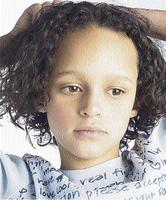Heather Little-White, PhD Contributor
Child sexual abuse is at an all-time high in our society, resulting in children being brutalised, maimed and murdered. Those who escape murder are left with emotional scars which may cause them to suffer through their adult life.
Many of our children suffer in silence because they are afraid to tell anyone of their ordeal, or because the adults to whom they may report the abuse refuse to believe them.
What is child sexual abuse?
While there is no universal definition of child sexual abuse, one central element is the dominance and power play of an adult or older peer who forces or coaxes a child into some form of sexual activity. Children who are sexually abused may have had their genitals fondled, forced to masturbate, may have had oral stimulation of their genitals by their abusers, or forced into vaginal and anal intercourse.
Who would want to molest children in their innocent period of growing up?
Surprisingly, child sexual abusers are everywhere, inside and outside the home. They are generally men, although some women sexually abuse children for their own sexual gratification, or to initiate young boys into sexual intercourse. Within the family, the common abusers may be father (rare cases of a mother), step-father, sibling or a relative, like uncle or cousin.
Outside the home, the abuser may be a family friend, neighbour, caregiver at the nursery, teacher, doctor and other trusted professionals, or a stranger. Many abusers were victims of sexual abuse during their childhood.
How do child abusers get their victims to comply?
Child sex abusers are able to encourage their child victims to comply with their sexual demands by 'grooming' them with attention, affection and gifts of money and other 'treats'. Abusers may even 'groom' the mother or caregiver of the child in order to win the family's trust to gain access to the child.
A child who knows and cares for the abuser may become so trapped between repeated acts of sexual abuse and the affection or loyalty for the abuser that he or she may not tell anyone about the abuse. The child sexual abuser usually makes the child victim extremely fearful of telling.
What is the effect of sexual abuse on children?
A child who is sexually abused may develop low self-esteem and feelings of worthlessness and may have a distorted view of sex. Very often, there are no signs of sexual abuse and it is only a doctor who may detect signs of sexual abuse. However, parents should be vigilant for other signs that may develop after child sexual abuse. These include:
Problems falling asleep Withdrawal from family and friends Refusal to attend school Behavioural problems at school Unusual aggressiveness Fear that something is wrong with the genitals Depression Unusual interest in or avoidance of all sexually related things Fear of persons of the opposite sex SecretivenessHow can parents prevent or reduce the chance of child sexual abuse?
While the typical advice is not to talk to strangers, most child sexual abusers are known to their victims. Parents should constantly remind children that if someone including an adult, tries to touch their bodies, especially their 'private parts', and do things that make them feel 'funny', they should say 'no' to the person and tell parents right away. If a child finds the courage to talk to parents about being sexually abused, parents should try to remain calm and reassure the child that what happened was no fault of his or her own. Children should also learn that being respectful to adults does not mean blind obedience to anyone in authority, especially if a request is made to engage in activities that would make them uncomfortable. Although parents may feel uncomfortable about bringing up sexual matters, they should at an early age establish dialogue about sexual issues with their children. Sex education should be taught very early in mainstream education in schools. Parents should foster in their children a sense of ownership of their bodies, which will help them reject activities that may not be good for them. If children do not feel comfortable in hugging as part of a greeting, do not force them to do so. Parents should also treat their children's body with respect, and they will in turn treat their bodies with respect. Parents should not consistently beat, hit and physically mistreat their children at home, as children will feel that other adults are entitled to abuse and misuse their bodies.What should parents do if they think their children have been molested?
Encourage the child talk with you or another trusted adult in a safe environment. Encourage children to relate their experience but be careful not to lead them to think about events that may not have taken place. Control displaying emotions that would influence the child's version of the incident. Arrange for immediate medical examination for the child and traumatised family members who may need counselling and psychiatric help. Report the matter to the police.Can children recover from sexual abuse?
Factors like age at abuse, frequency and duration of the abuse, the degree of force, the relationship of the child to the abuser, disclosure of the abuse, level of confidence in a trusted adult, family and extra-familial support all influence how a child recovers from sexual abuse.
Victims should be encouraged to relinquish any guilt they have about the abuse. With counselling and psychotherapy, children may eventually return to normal life.
"Child abuse casts a shadow the length of a lifetime."
- Herbert Ward

